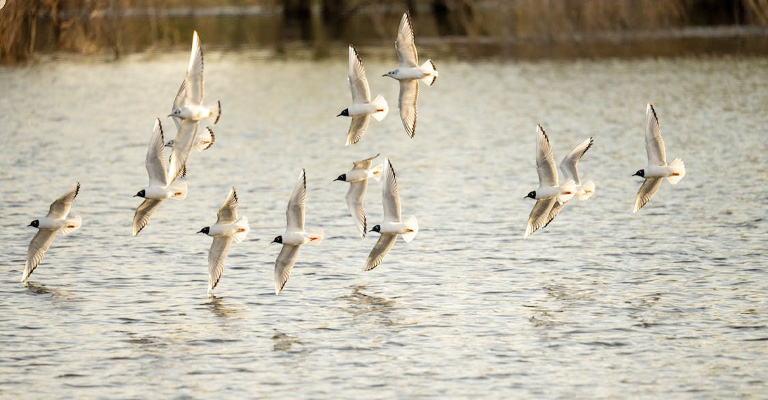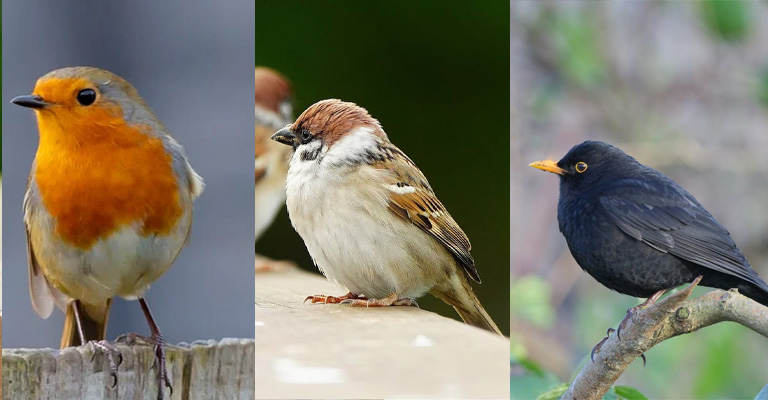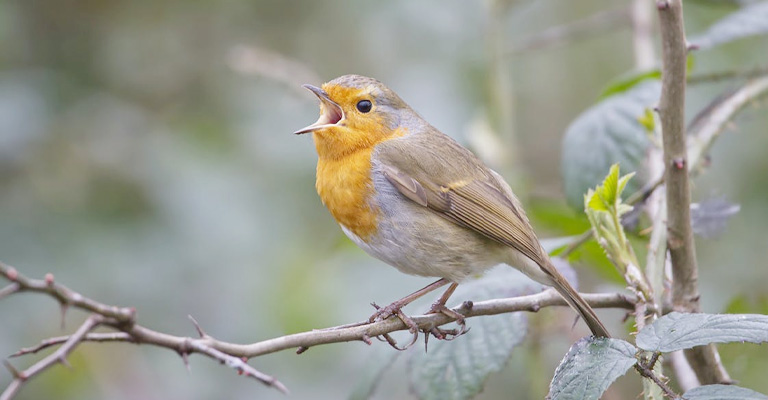Have you ever wondered why birds are notorious for waking up at the crack of dawn, serenading us with their melodious songs while most of us are still fast asleep? The phenomenon of birds rising early has intrigued scientists and bird enthusiasts alike for centuries.
While some may dismiss it as a mere coincidence, there is a fascinating array of reasons behind this avian behavior.
From evolutionary advantages to environmental factors, the early morning habits of birds hold valuable insights into their survival strategies and biological rhythms.
In this article, we delve into the intriguing world of avian sleep patterns, exploring the reasons why do birds wake up so early and how their early morning activities contribute to their overall well-being.

Why Do Birds Wake Up So Early?
Birds are known for their early morning chirping and activity, often waking up before the sun rises. There are several reasons why birds have evolved to be early risers. Here are nine possible explanations for their early morning habits:
Optimal Feeding Opportunities
Many bird species are diurnal, meaning they are most active during daylight hours. By waking up early, birds can take advantage of the abundance of insects and other prey that are also active during the early morning hours.
Reduced Competition
By waking up early, birds can avoid competition with other diurnal animals, such as mammals, reptiles, and other birds. This gives them a competitive advantage in finding food and establishing territories.
Thermoregulation
Early mornings are often cooler than the rest of the day, especially during hot summer months.
By starting their activities early, birds can take advantage of the cooler temperatures to forage for food and engage in other energy-demanding activities without overheating.
Predation Avoidance
Many predators, such as hawks and owls, are less active during the early morning hours. By waking up early, birds can reduce their risk of predation and increase their chances of survival.
Courtship and Mating
For many bird species, the early morning is the prime time for courtship displays and mating. By waking up early, birds can engage in elaborate courtship rituals, sing their songs, and attract potential mates.
Territory Defense
Birds are highly territorial creatures, and the early morning is when they are most active in defending their territories. By waking up early, birds can patrol their territories, mark boundaries, and deter intruders before other animals become active.
Efficient Nesting
Birds often build nests in trees, shrubs, or other elevated locations. By waking up early, they can gather nesting materials, construct or repair their nests, and ensure the safety and comfort of their offspring before the day gets busier.
Vocal Communication
Birds use vocalizations to communicate with each other, establish territories, and attract mates. The early morning is an ideal time for birds to sing their songs because the air is usually calm and carries sound more effectively. By waking up early, birds can maximize the effectiveness of their vocalizations.
Circadian Rhythms
Birds, like many other animals, have internal biological clocks that regulate their daily activities. These circadian rhythms are influenced by environmental cues, such as light and temperature.
Waking up early may be a result of their natural biological clocks, which have evolved to synchronize with the rising sun.
What Factors Make Birds Wake Up Early?

Several factors contribute to birds waking up early in the morning. Here are some key factors that influence their early morning habits:
Light and Circadian Rhythms
Birds have internal biological clocks known as circadian rhythms, which regulate their daily activities. These rhythms are influenced by environmental cues, particularly light. As the sun rises, the increasing light triggers birds to wake up and become active.
Foraging Opportunities
Many bird species are diurnal, meaning they are most active during daylight hours. By waking up early, birds can take advantage of the abundance of insects, worms, and other prey that are also active during the early morning hours. This allows them to find food more easily and efficiently.
Predation Avoidance
Predators, such as hawks and owls, are often less active during the early morning hours. By waking up early, birds can reduce their risk of predation and increase their chances of survival. They can forage and engage in other activities while predators are less active.
Temperature and Energy Conservation
Early mornings are typically cooler than the rest of the day, especially during the hot summer months.
By starting their activities early, birds can take advantage of the cooler temperatures to forage for food and engage in other energy-demanding activities without overheating. This helps them conserve energy and avoid the heat stress of the later hours.
Courtship and Mating
The early morning is a crucial time for courtship displays and mating in many bird species. By waking up early, birds can engage in elaborate courtship rituals, sing their songs, and attract potential mates.
The calm and quiet atmosphere of the early morning enhances the effectiveness of their courtship behaviors.
Territory Defense
Birds are highly territorial creatures, and the early morning is when they are most active in defending their territories.
By waking up early, birds can patrol their territories, mark boundaries, and deter intruders before other animals become active. This helps them establish and maintain their territories more effectively.
Vocal Communication
Birds use vocalizations to communicate with each other, establish territories, and attract mates. The early morning is an ideal time for birds to sing their songs because the air is usually calm and carries sound more effectively.
By waking up early, birds can maximize the effectiveness of their vocalizations and communicate with other individuals more efficiently.
Nesting and Parental Care
Birds often build nests in trees, shrubs, or other elevated locations. By waking up early, they can gather nesting materials, construct or repair their nests, and ensure the safety and comfort of their offspring before the day gets busier. Early morning activities also allow them to feed their young and provide parental care.
Biological Adaptations
Over time, birds have evolved to be early risers due to various biological adaptations. These adaptations include specialized eyes that are more sensitive to low light levels, efficient digestion to process food quickly, and enhanced hearing to detect sounds in the early morning environment.
What Kind of Birds Chirp in the Morning?

Many bird species are known for their early morning chirping. Here are some common types of birds that are known to chirp and sing during the morning hours:
Robins
American Robins are well-known for their melodious songs, which often begin at dawn. Their cheerful, flute-like chirping is a familiar sound in many North American neighborhoods.
Sparrows
Various species of sparrows, such as the House Sparrow and Song Sparrow, are early-morning singers. They produce a series of rapid, repetitive chirps and trills that can be heard throughout their territories.
Blackbirds
Red-winged Blackbirds and Common Grackles are known for their distinctive calls, which often start before sunrise. Their songs consist of a mix of whistles, chatters, and harsh notes.
Thrushes
The American Robin, as mentioned earlier, is a type of thrush. Other thrush species, such as the Wood Thrush and Hermit Thrush, are also known for their beautiful morning songs. Their melodies are often flute-like and ethereal.
Warblers
Many species of warblers are early morning singers. These small, colorful birds produce a variety of high-pitched, musical songs. Examples include the Yellow Warbler, Black-throated Green Warbler, and Common Yellowthroat.
Cardinals
Male Northern Cardinals are known for their loud, clear whistling songs. They often start singing before sunrise and continue throughout the day. Their songs are rich and melodious.
Wrens
Wrens, such as the Carolina Wren and House Wren, are known for their energetic and complex songs. They produce a series of rapid trills, buzzes, and melodious notes that can be heard during the early morning hours.
Finches
Various finch species, including the House Finch and American Goldfinch, are early-morning singers. Their songs are often cheerful and musical, consisting of a mix of whistles and trills.
Mockingbirds
Northern Mockingbirds are famous for their ability to mimic the songs of other birds. They often sing during the early morning hours, showcasing their impressive repertoire of diverse melodies.
Larks
Meadowlarks and Skylarks are known for their beautiful, melodious songs that are often heard during the early morning. Their songs are rich and complex, consisting of a series of whistles, warbles, and trills.
These are just a few examples of the many bird species that chirp and sing in the morning. Each species has its own unique song, contributing to the rich chorus of sounds that can be heard during the early hours of the day.
Fascinating Facts About the Dawn Chorus

The dawn chorus, also known as the “morning chorus,” is a fascinating natural phenomenon that occurs when birds sing together in the early morning hours. Here are some fascinating facts about the dawn chorus:
Timing
The dawn chorus typically begins about an hour before sunrise and lasts for a couple of hours. This is when birds are most active and vocal, as they establish territories, attract mates, and communicate with other individuals.
Species Diversity
The dawn chorus often involves a wide variety of bird species singing together. Different species have distinct songs and calls, creating a rich and complex symphony of sounds.
Male Display
Male birds are the primary singers during the dawn chorus. They use their songs to establish and defend territories, attract mates, and communicate with other males.
Louder in Spring
The dawn chorus is particularly intense during the breeding season, which is typically in spring. This is when birds are most active in defending territories and attracting mates, resulting in a higher volume of songs.
Acoustic Advantage
Singing in the early morning provides birds with an acoustic advantage. The air is usually calm and carries sound more effectively, allowing their songs to travel longer distances and be heard by potential mates and rivals.
Species Recognition
Birds use their songs to communicate and establish their species’ identity. By singing in the dawn chorus, they can recognize and locate individuals of their own species, which is crucial for breeding and social interactions.
Cultural Learning
Young birds learn their species-specific songs by listening to and imitating the songs of adult birds during the dawn chorus. This cultural learning ensures that each generation maintains the unique songs of their species.
Health Indicator
The quality and vigor of a bird’s song during the dawn chorus can indicate its overall health and fitness. Males with strong, complex songs are often perceived as more attractive to potential mates.
Urban Adaptation
Some bird species have adapted to urban environments and participate in the dawn chorus even in cities. This adaptation demonstrates the resilience and adaptability of birds in the face of human-made changes to their habitats.
The dawn chorus is a remarkable natural phenomenon that showcases the beauty and complexity of bird vocalizations. It serves multiple purposes, including territorial defense, mate attraction, and species recognition.
Listening to the dawn chorus can be a delightful experience, providing a glimpse into the vibrant world of birds during the early morning hours.
FAQs
Birds wake up early for several reasons. One main reason is to take advantage of optimal feeding opportunities.
Many bird species are diurnal and rely on daylight to find food. By waking up early, they can exploit the abundance of insects and other prey that are also active during the early morning hours.
No, not all birds wake up early. While many bird species are known for their early morning activity, there are exceptions.
Some birds, such as nocturnal species like owls and nightjars, are more active during the night and may sleep in during the early morning hours.
Birds have internal biological clocks known as circadian rhythms, which regulate their daily activities. These rhythms are influenced by environmental cues, particularly light. As the sun rises, the increasing light triggers birds to wake up and become active.
Birds generally wake up at around the same time each day, but there can be some variation. Factors such as seasonal changes in daylight hours, weather conditions, and food availability can influence the exact timing of their waking.
Birds’ waking patterns are primarily driven by their internal biological clocks and natural environmental cues.
While it may be possible to influence their waking time to some extent through artificial lighting or other manipulations, it is challenging to completely change their innate waking behavior.
Bottom Line
As we conclude our exploration into the fascinating world of early bird wake-up calls, we have uncovered a multitude of reasons behind this intriguing behavior.
From the advantages of foraging in the early morning hours to the need for establishing territories and attracting mates, birds have evolved to make the most of the early hours.
Additionally, environmental factors such as temperature, light, and predator avoidance play a significant role in shaping their waking patterns.
By understanding the biological rhythms and survival strategies of birds, we gain a deeper appreciation for their remarkable adaptability and resilience.
So, the next time you hear the cheerful chorus of birdsong at dawn, remember that there is a complex web of reasons behind their early morning wake-up calls.